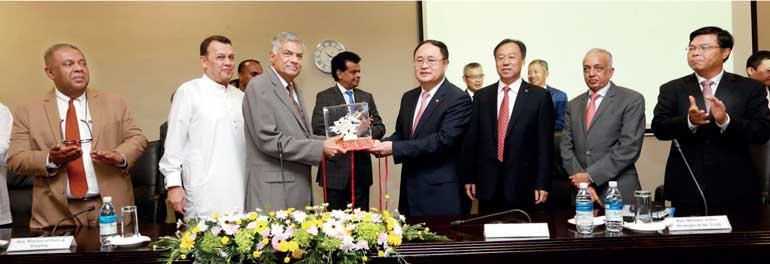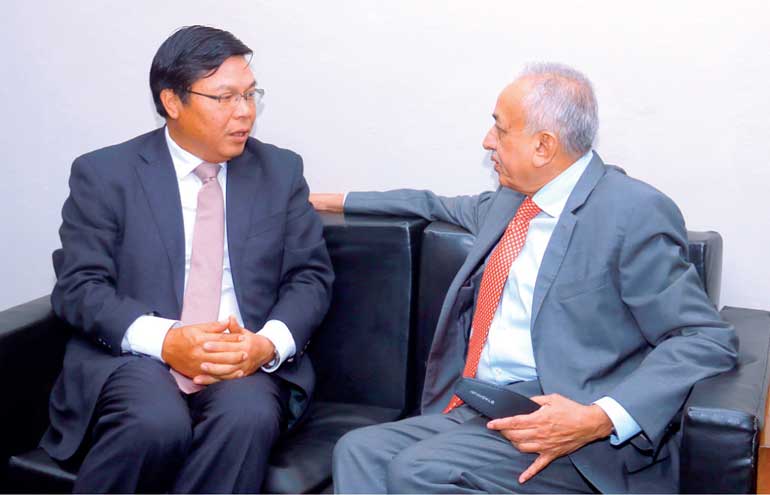Wednesday Feb 25, 2026
Wednesday Feb 25, 2026
Monday, 11 December 2017 00:00 - - {{hitsCtrl.values.hits}}
Development Strategies and International Trade Minister Malik Samarawickrama on Saturday declared that the Government’s new deal for Hambantota Port with China Merchant will usher economic transformation in the country, especially in the Southern and Uva Provinces. He made this observation in his speech at the signing of the Special Development Project Status for the Hambantota port and the handover to China Merchant-led joint venture companies with Sri Lanka Ports Authority. Following is the full text of Minister Samarawickrama’s speech:

We have embarked on a focused economic development drive that aims to transform this country by generating new investment, new economic opportunities for more people, and creating more and better jobs. In this effort, one of the biggest challenges that our Government has had to grapple with is the heavy overhang of debt, due to unfeasible projects undertaken in the past and a buildup of unproductive assets.
The Hambantota Port is one such project. Our Government, under the leadership of President Sirisena and Prime Minister Wickremesinghe, identified this as a priority issue to resolve, and today we are at the moment of that final resolution. The day that the burden of an unproductive asset is lifted off our shoulders, and an important step is taken towards making Hambantota Port contribute positively to our economy.
Hambantota Port was built with a loan of Rs. 193 billion. To date, the Port of Hambantota has severely underperformed and recorded an accumulated loss of over Rs. 46.7 billion as at the end of 2016. It was built with little attention to its commercial viability and with little consideration for the burden it would place on our people if it isn’t operationalised properly. It is our poor people who have to bear this burden for generations.
No Sri Lankan with a right conscience could watch this go on. We had to look for ways to lift this burden off the people, while not losing this public asset. And this is what we are doing today. All of my fellow members of this House who vote in favour of this will be contributing towards an important national decision today.
The way in which this project has been structured – it brings in much-needed foreign investment, but at the same time complies with all relevant international laws, and most importantly takes well into account Sri Lanka’s national security and national interest considerations.

Development Strategies and International Trade Minister Malik Samarawickrama with Chinese Ambassador Yi Xianliang
An important point for us to note is that the two companies – Hambantota International Port Services and Hambantota International Port Group – are two companies that are registered in Sri Lanka, will operate by all our laws like anyone other company, and the asset remains Sri Lankan. Yes, there is majority Chinese equity, but both legal entities are Sri Lankan.
We often talk about how Sri Lanka has a wonderful strategic geographic location in the India Ocean, and how the Hambantota Port is in a prime location to take advantage of this. But the best of locations and the great potential that is promised is nothing if it is not properly operationalised. This was the case of the Hambantota Port. What we are now doing is to ensure it is better operationalised, fully utilised, and truly be an economic contributor to the people of the Southern and Uva region as well as the whole country.
For too long now the country’s Gross Domestic Product has been concentrated in the Western Province – 42% of the GDP is generated from, and enjoyed by, the Western Province. While the Southern Province is at just 10.8% and Uva is at 5%. Why is the Western Province so dominant? A key reason is that there is a well-operationalised and competitive sea port and airport.
Building infrastructure alone is not enough, it has to be run competitively and efficiently. Through this project we will finally be able to deliver economic transformation to these two regions that have been left out from economic growth over the past several decades.
Just like what Colombo Port has become for the Western Province, an efficient and competitive port in the South, can help the Southern and Uva regions connect with international trade, connect with the forthcoming new trade agreements and also the opportunities from GSP Plus.
Before I close, let me recap the importance of this project for our macroeconomic strength. The project will bring in an FDI inflow of $ 1.12 billion. There will be an immediate positive impact on our foreign inflows, as the Chinese entity brings in an immediate advance payment of 30%. The balance will be received within six months.
Thereafter, the two new companies are likely to invest a further $ 500-600 m for infrastructure development over the project implementation period adding more FDI inflows to the country.
In addition to this, the newly operational port and surrounding industrial zone will attract new investors – in bunkering and port-linked industries such as a refinery, cement plants, a dockyard, etc. All of this will create new opportunities for local entrepreneurs of the area and create new and better jobs.